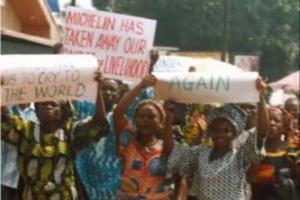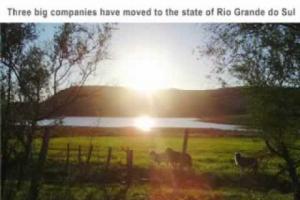As experts like geographer Carlos Walter Porto-Gonçalves have repeatedly stressed, economic models based on monoculture plantation activities will always be incompatible with a healthy, balanced environment. Any industrial-scale monoculture activity, and especially plantations of millions of cloned eucalyptus trees, cannot contribute to the goal of so-called sustainable development.
Brazil
Other information
30 January 2010
Bulletin articles
30 August 2009
In mid-July the Clean Development Mechanism (CDM) Executive Board accepted a new methodology proposed as part of the controversial Plantar project in Minas Gerais, Brazil (see background on Plantar on WRM bulletins 84,http://www.wrm.org.uy/bulletin/84/Plantar.html, 70 and 72).
Bulletin articles
30 August 2009
For over a decade, the World Rainforest Movement has been denouncing that -by certifying large scale tree plantations- the FSC is greenwashing the destructive activities of plantation companies in Southern countries (for further information seehttp://www.wrm.org.uy/actors/FSC/index.html).
Other information
30 July 2009
On 9 July 2008 the Brazilian Senate adopted a provision by the Executive known as a “provisional measure,” subject to the subsequent approval of the Legislative. The provision has been harshly questioned by environmentalists and various political and social sectors in Brazil, including the former Minister of the Environment, Senator Marina Silva.
Bulletin articles
30 July 2009
One year ago, Judson Barros, Coordinator of the Piaui Environmental Network stated that “the south of Piaui has been destroyed, its rivers and streams poisoned to satisfy the voraciousness of some companies that seek easy profit through the destruction of ecosystems, with their coal, soybean, timber, castor-oil and eucalyptus activities. The wealth produced remains in the hands of a few people, while most of the population continues living but not enjoying the assets offered for free by Mother Nature.
Other information
29 June 2009
“Eucalyptus is the perfect neoliberal tree. It grows quickly, turns a quick profit in the global market and destroys the earth.”—Jaime Aviles, La Jornada
Other information
29 April 2009
On International Women’s Day in Brazil, once again women lead the struggle against monoculture tree plantations.
Starting in 2006, when close on 2 thousand peasant women from Via Campesina destroyed greenhouses and nearly 8 million eucalyptus saplings belonging to the pulp mill company Aracruz Celulose (see WRM Bulletin No. 104), 8 March has now become a day for mobilization and complaints against monoculture tree plantations.
Other information
29 April 2009
April 17 has been declared by La Via Campesina the “International Day of Peasant’s Struggles” to commemorate the slaughter by the Brazilian police in 1996 of 19 peasants of the “landless” movement while they mobilized to get access to some land.
The land issue has becoming a major one in Brasil and the Movement of Landless Rural Workers MST have been very active.
Bulletin articles
30 March 2009
World consumption of paper has exploded over the past 50 years. Only about 1/3 of paper production is used for writing and printing paper, most of it is used for advertising. And almost half of all paper produced is used for packaging.
Other information
30 March 2009
If after reading the above articles you (as a woman within an organization, as a member of a women’s movement, as an activist on human rights issues, as an environmentalist, as a journalist, as a member of a consumer’s association, as a campaigner on climate issues, trade issues, health issues, etc) are wondering what you can do to start making changes to the current situation, we have some ideas that we hope may be of use.
Multimedia
11 March 2009
By the World Rainforest Movement and Forest and Biodiversity Program of Friends of the Earth International
Other information
27 February 2009
In 1991, the Veracel Celulose company, then known as Verazcruz Florestal, first arrived in the extreme south region of the state of Bahia.
Originally, this hot, humid region was covered with various types of Atlantic Forest, which has since been destroyed and replaced with crops, pastureland and monoculture eucalyptus tree plantations.


